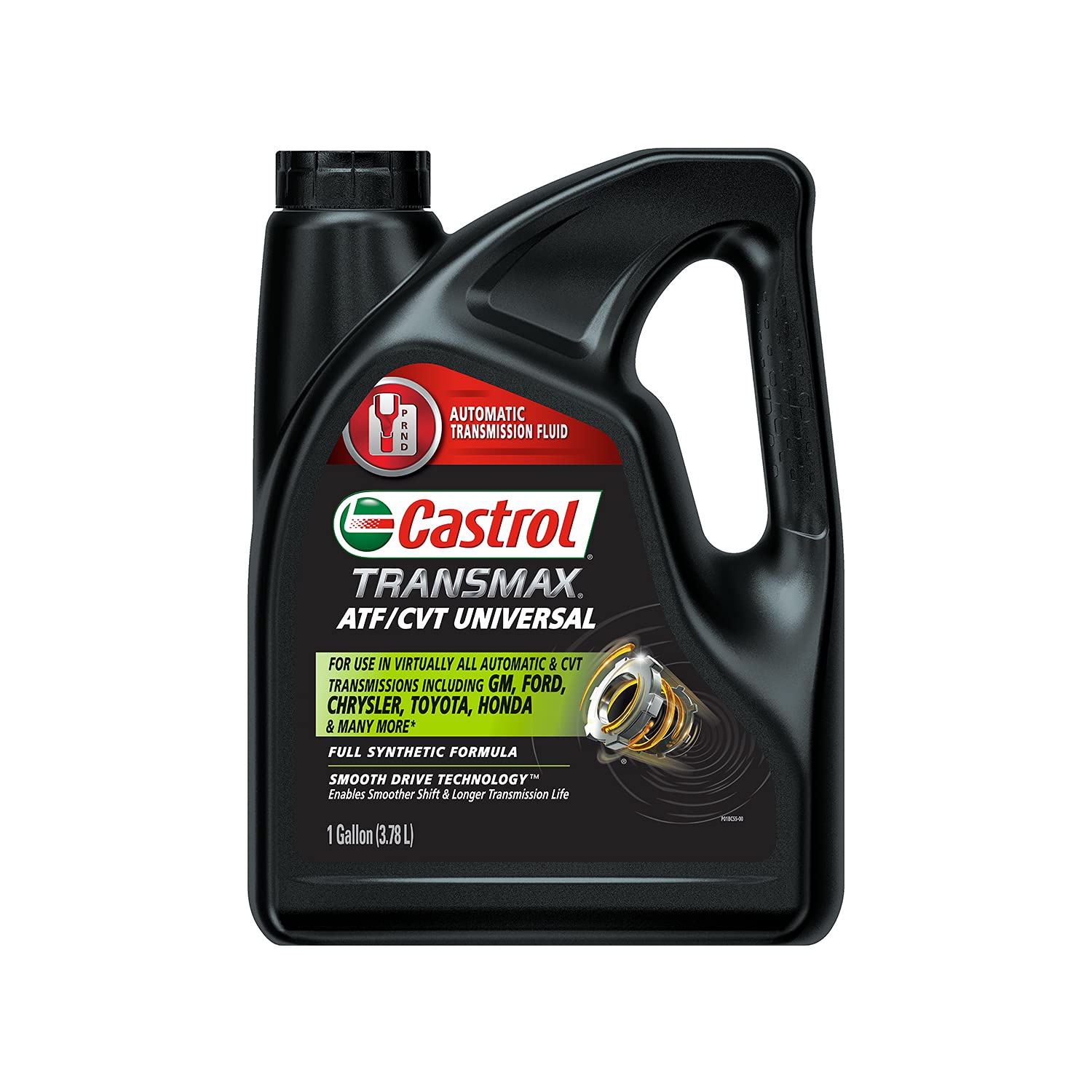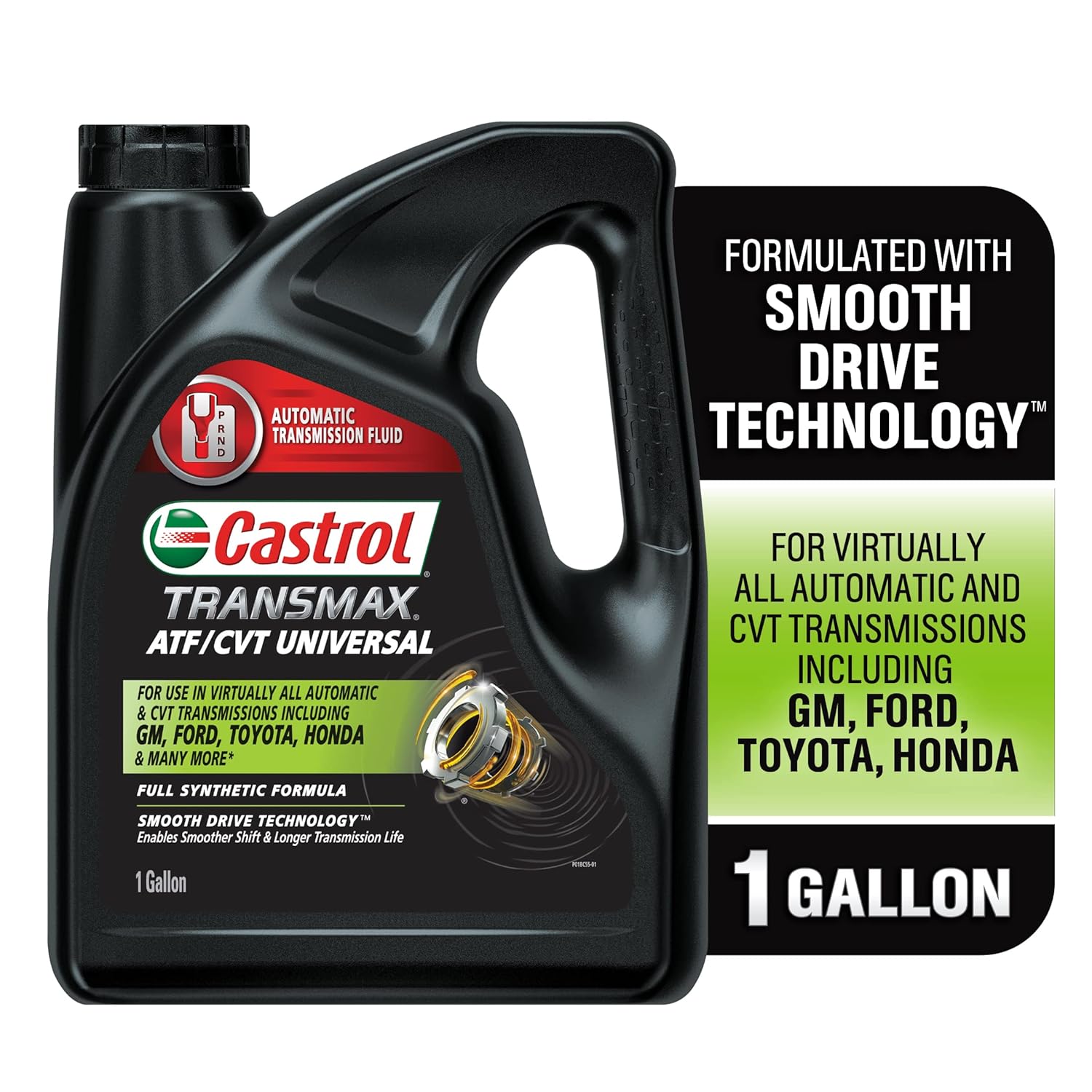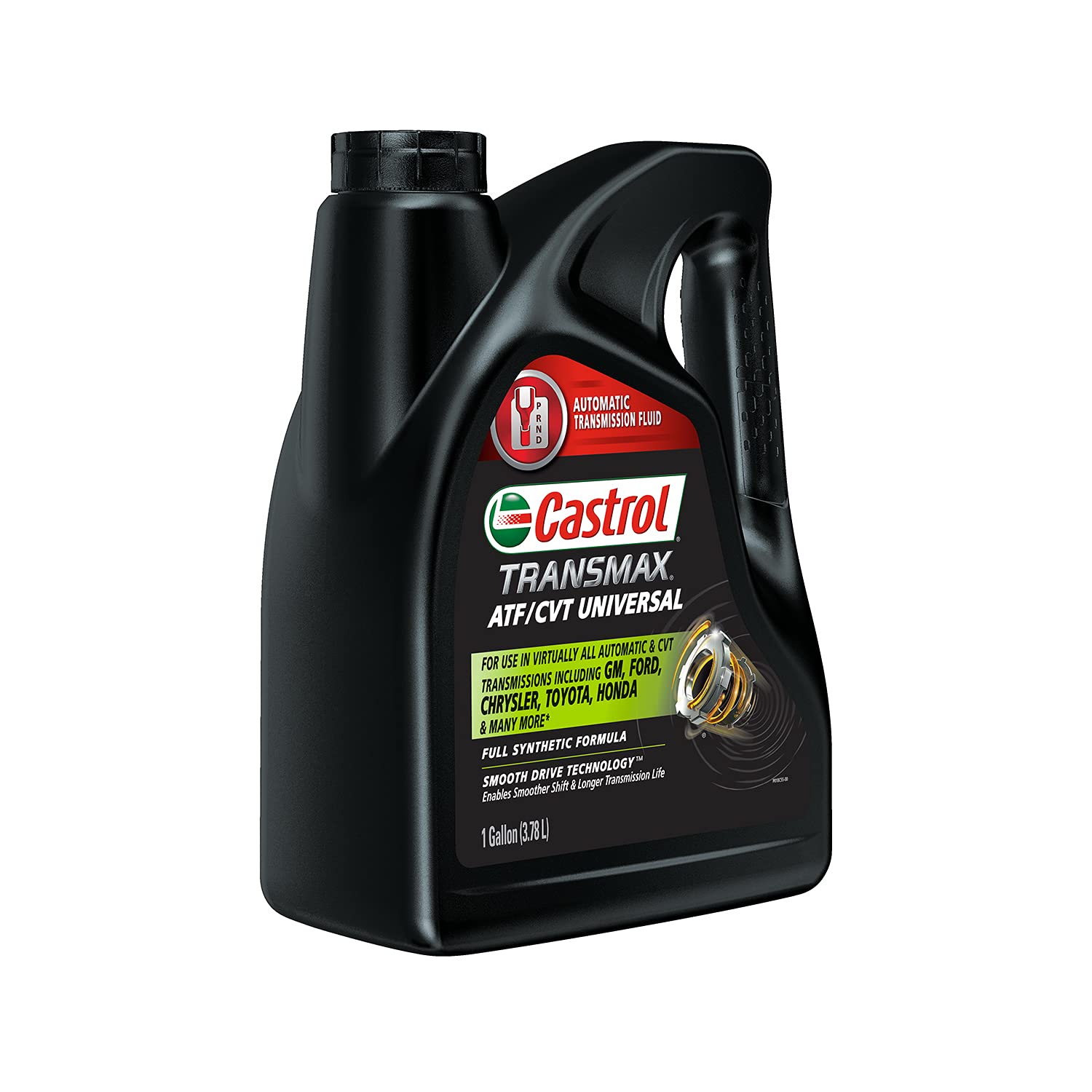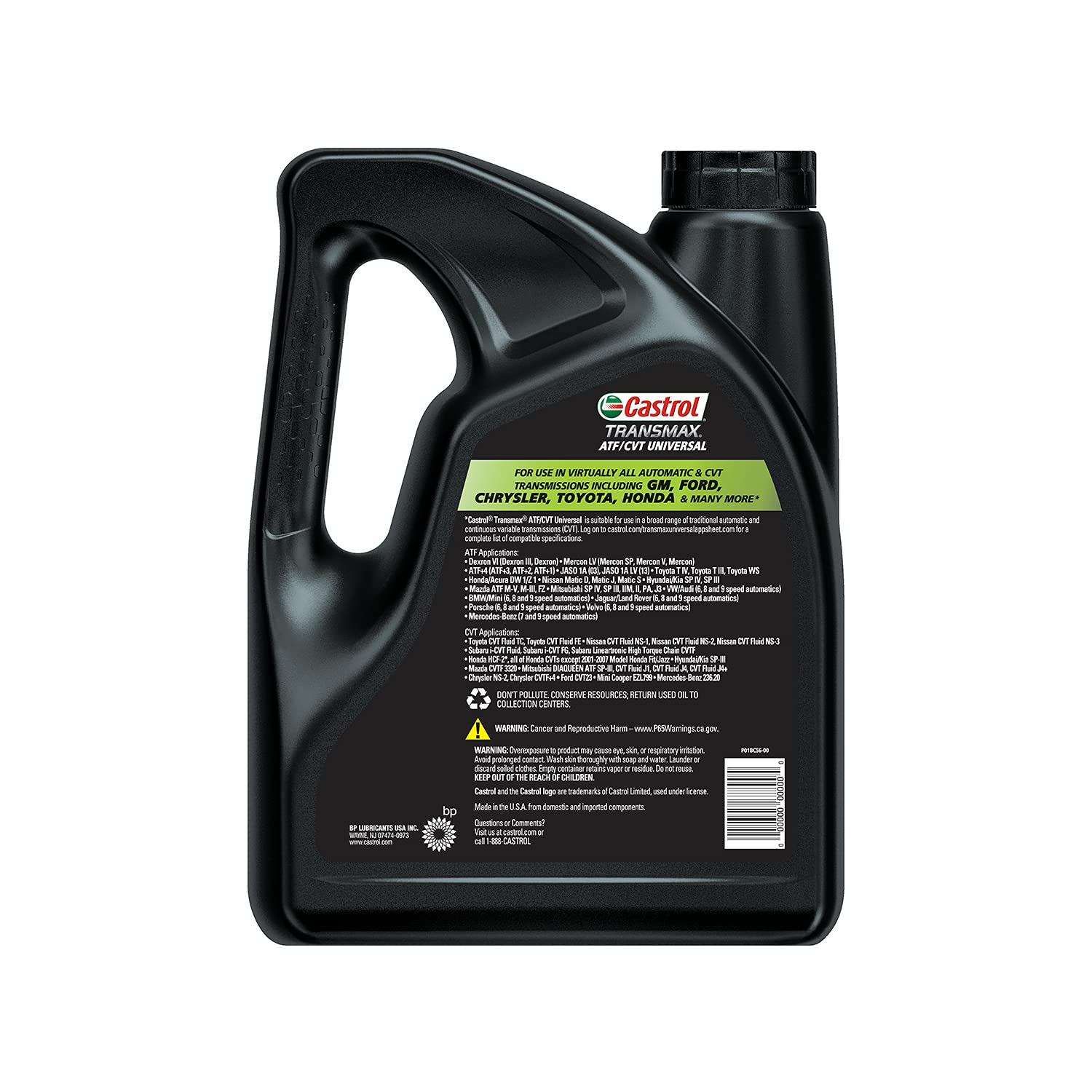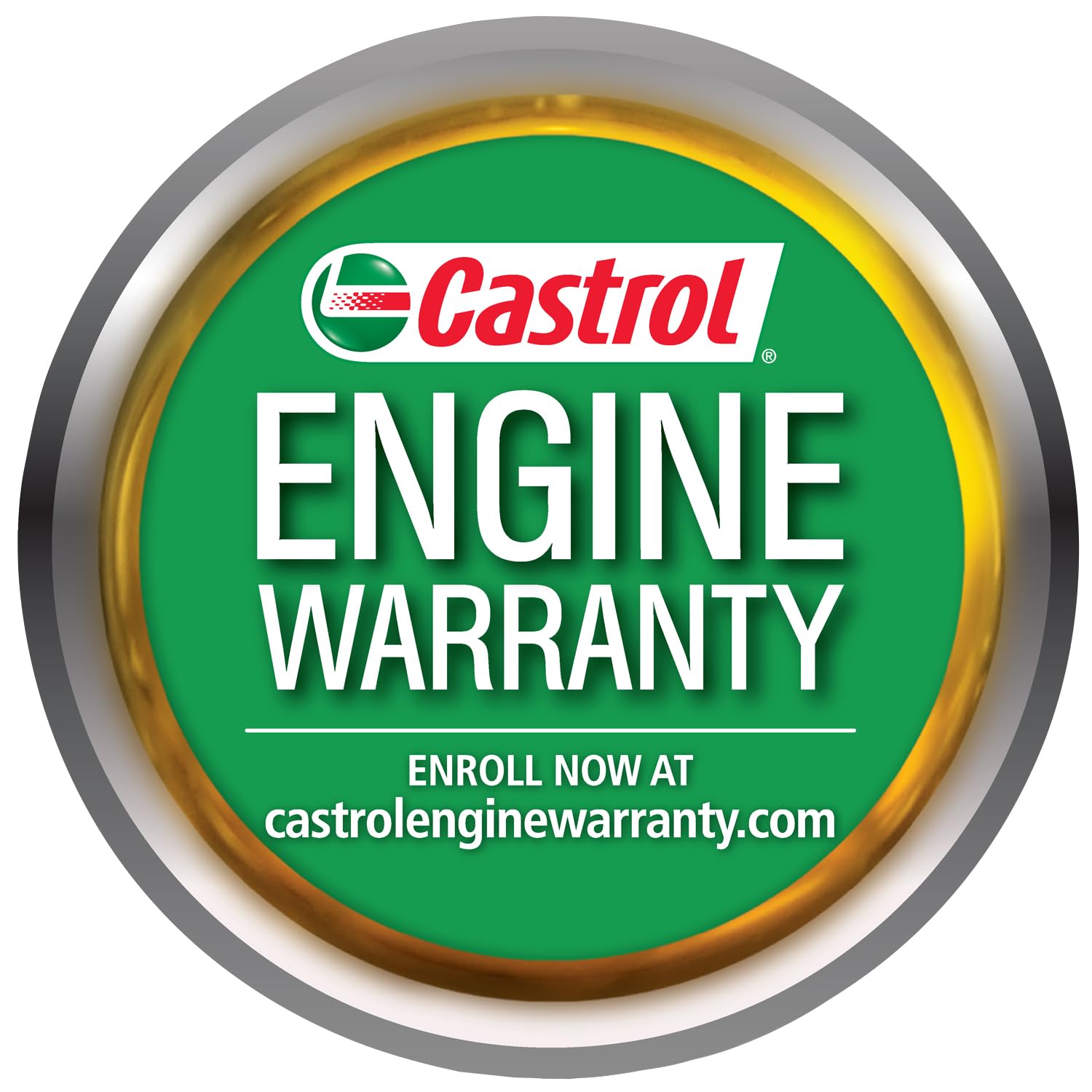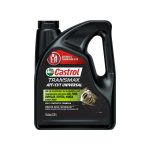
Castrol Transmax ATF/CVT Universal Review transaxle fluid – Oemiu
Castrol Transmax ATF/CVT Universal Review: A Deep Dive
Choosing the right transaxle fluid for your vehicle can feel like navigating a minefield. With so many brands and types available, each promising superior performance, it’s easy to get lost in the jargon and technical specifications. This article aims to cut through the noise and provide a comprehensive review of Castrol Transmax ATF/CVT Universal, exploring its features, benefits, drawbacks, and overall suitability for a wide range of vehicles. We’ll delve into the technology behind this fluid, compare it to alternatives, and help you determine if it’s the right choice to keep your transmission running smoothly and efficiently. Your transmission is the unsung hero of your vehicle’s drivetrain, and proper maintenance, starting with the right fluid, is paramount to its longevity and performance. We will consider many aspects of this universal fluid, including situations when you might want to choose a specific transaxle fluid rather than a universal one.
Understanding the Versatility of Universal ATF/CVT Fluids
The promise of a “universal” automatic transmission fluid (ATF) or continuously variable transmission (CVT) fluid is inherently appealing. Instead of stocking multiple fluids for different vehicles or constantly consulting compatibility charts, a single product can theoretically cover a broad spectrum of applications. Castrol Transmax ATF/CVT Universal aims to deliver on this promise, formulated to meet the requirements of numerous original equipment manufacturer (OEM) specifications. The key to its versatility lies in its carefully balanced formulation of base oils and additives. These additives are designed to provide the necessary friction characteristics, wear protection, and thermal stability required by a wide range of transmissions. It’s a complex balancing act, as different transmissions have different needs. Some require high friction for smooth shifting, while others need low friction to prevent slippage. Achieving this delicate balance is what separates a truly universal fluid from a merely adequate one. This particular fluid is formulated for both automatic and CVT transmissions, further expanding its potential applications. Consider the convenience for a shop that services a wide variety of vehicles: instead of stocking a dozen different fluids, they can potentially streamline their inventory with a single product like Castrol Transmax ATF/CVT Universal. However, it’s crucial to understand the limitations of universal fluids. While they strive to meet the minimum requirements of many specifications, they may not always provide the optimal performance or protection of a fluid specifically designed for a particular transmission. For example, a high-performance vehicle or one with a particularly demanding transmission design might benefit from a fluid with a more specialized additive package.
Furthermore, the term “universal” doesn’t necessarily mean “compatible with every transmission ever made.” It’s essential to consult the product specifications and your vehicle’s owner’s manual to ensure compatibility. Even with a universal fluid, verifying its suitability for your specific application is paramount. A good practice is to compare the Castrol Transmax ATF/CVT Universal specifications to those recommended by your vehicle’s manufacturer. Look for explicit approvals or statements of compliance. If there’s any doubt, it’s always best to err on the side of caution and use a fluid specifically recommended for your vehicle. While a universal fluid might seem like a cost-effective solution, using the wrong fluid can lead to premature wear, slippage, or even complete transmission failure, ultimately costing you far more in the long run. Consider a scenario where a vehicle owner uses a universal fluid in a transmission that requires a very specific friction modifier. Over time, the lack of the proper modifier could lead to shuddering, harsh shifting, and accelerated wear on the clutch packs. In such a case, the convenience and potential cost savings of the universal fluid would be quickly negated by the cost of repairing or replacing the transmission. Thus, despite the claims of universality, careful consideration and verification are always necessary.
Key Features and Benefits of Castrol Transmax ATF/CVT Universal
Castrol Transmax ATF/CVT Universal boasts a range of features designed to provide optimal performance and protection in a variety of transmissions. One of its key features is its enhanced friction durability, which helps to maintain smooth and consistent shifting performance over the life of the fluid. This is particularly important in transmissions that rely on precise friction control for proper operation. Another important aspect is its superior wear protection, which helps to extend the life of critical transmission components. The fluid contains additives that form a protective layer on metal surfaces, reducing friction and wear even under extreme conditions. Thermal stability is another critical attribute, especially in modern transmissions that operate at higher temperatures. Castrol Transmax ATF/CVT Universal is formulated to resist oxidation and breakdown at high temperatures, preventing the formation of sludge and varnish that can clog valve bodies and other critical components. Furthermore, the fluid exhibits excellent shear stability, meaning it maintains its viscosity even under high stress and shear conditions. This is important for ensuring consistent performance and protection throughout the drain interval.
The benefits of these features translate into tangible advantages for vehicle owners. Improved shifting performance, reduced wear, extended transmission life, and enhanced fuel economy are all potential benefits of using Castrol Transmax ATF/CVT Universal. The “universal” nature of the fluid also offers convenience and simplifies inventory management, especially for shops servicing a wide range of vehicles. However, as mentioned earlier, it’s crucial to remember that “universal” doesn’t guarantee optimal performance in every application. Consider a high-performance vehicle with a specialized transmission design. While Castrol Transmax ATF/CVT Universal might meet the minimum requirements, a fluid specifically formulated for that transmission might offer superior performance and protection. For instance, a fluid with a higher viscosity index or a more robust additive package might be better suited for the demanding conditions of a high-performance transmission. The specific type of transaxle fluid is highly important for some vehicle applications. In summary, while Castrol Transmax ATF/CVT Universal offers a compelling combination of features and benefits, careful consideration of your vehicle’s specific requirements is always essential. It’s a strong contender for everyday vehicles, but may not be the best choice for specialized or high-performance applications.
| Feature | Benefit |
|---|---|
| Enhanced Friction Durability | Smooth and Consistent Shifting |
| Superior Wear Protection | Extended Transmission Life |
| Excellent Thermal Stability | Reduced Sludge and Varnish Formation |
| Exceptional Shear Stability | Consistent Performance Under Stress |
Comparing Castrol Transmax ATF/CVT Universal to the Competition
The market for automatic transmission fluids and CVT fluids is crowded, with numerous brands vying for your attention. Understanding how Castrol Transmax ATF/CVT Universal stacks up against the competition is crucial for making an informed decision. Some of the key competitors in this space include brands like Mobil 1, Valvoline, Amsoil, and Pennzoil. Each of these brands offers a range of ATF and CVT fluids, some of which are also marketed as “universal” or multi-vehicle fluids. When comparing these fluids, it’s important to consider factors such as viscosity, additive package, temperature stability, and price. Mobil 1 Synthetic ATF, for example, is known for its excellent high-temperature performance and wear protection. Valvoline MaxLife ATF is a popular choice for older vehicles and those with higher mileage, thanks to its seal conditioners and anti-wear additives. Amsoil Synthetic Multi-Vehicle ATF is another premium option, offering superior performance and protection in a wide range of applications. Pennzoil Platinum High Mileage ATF is specifically designed for vehicles with over 75,000 miles, providing enhanced protection against wear and tear.
Compared to these competitors, Castrol Transmax ATF/CVT Universal offers a compelling balance of performance, versatility, and price. While it may not offer the absolute highest level of performance in every single category, it provides a solid level of protection and performance across a wide range of transmissions. Its “universal” formulation simplifies inventory management and reduces the risk of using the wrong fluid. However, it’s important to note that some competitors may offer fluids specifically formulated for certain vehicle makes or transmission types. For example, Amsoil offers a dedicated CVT fluid that may provide superior performance in certain CVT applications compared to a universal fluid like Castrol Transmax ATF/CVT Universal. Similarly, some manufacturers recommend specific fluids for their transmissions, and using a fluid that meets those specifications is often the best way to ensure optimal performance and longevity. The pricing can also be a factor. Some synthetic transaxle fluid options are more expensive than others. Consider the cost-effectiveness of the fluid in conjunction with its features and benefits. If you have a relatively new vehicle and follow a regular maintenance schedule, the extra investment in a premium synthetic fluid might be worthwhile. However, if you have an older vehicle or are on a tight budget, Castrol Transmax ATF/CVT Universal might be a more practical choice.
| Brand | Fluid Type | Key Features | Price (Approximate) |
|---|---|---|---|
| Castrol | Transmax ATF/CVT Universal | Universal formulation, enhanced friction durability, wear protection | $$ |
| Mobil 1 | Synthetic ATF | Excellent high-temperature performance, wear protection | $$$ |
| Valvoline | MaxLife ATF | Seal conditioners, anti-wear additives, suitable for high-mileage vehicles | $$ |
| Amsoil | Synthetic Multi-Vehicle ATF | Superior performance and protection in a wide range of applications | $$$$ |
| Pennzoil | Platinum High Mileage ATF | Enhanced protection for vehicles with over 75,000 miles | $$$ |
Price Key: $: Least expensive, $$$$: Most Expensive
Real-World Applications and User Experiences
Beyond technical specifications and marketing claims, real-world user experiences provide valuable insights into the actual performance of Castrol Transmax ATF/CVT Universal. Many users have reported positive experiences with this fluid, citing improvements in shifting smoothness, reduced transmission noise, and overall improved performance. Some users have also noted that the fluid helped to resolve issues such as shuddering or slipping in their transmissions. However, it’s important to note that individual experiences can vary depending on the vehicle, transmission type, and driving conditions. For example, a user with a high-performance vehicle might not experience the same level of improvement as a user with a standard passenger car. Similarly, a user who drives primarily in stop-and-go traffic might experience different results than a user who drives mostly on the highway.
One common application of Castrol Transmax ATF/CVT Universal is in older vehicles where the original fluid specification is no longer readily available. In such cases, a universal fluid can provide a convenient and cost-effective alternative. However, it’s crucial to verify that the fluid is compatible with the vehicle’s transmission and that it meets the minimum performance requirements. Another common application is in vehicles that are used for towing or other demanding applications. In these situations, the fluid’s enhanced wear protection and thermal stability can help to prevent premature transmission failure. However, it’s also important to consider upgrading to a more specialized fluid if the vehicle is subjected to extreme conditions or if the transmission is known to be particularly sensitive. While many users have reported positive experiences, some have also encountered issues. Some users have reported that the fluid did not completely resolve their transmission problems, while others have noted that it caused shifting issues or other performance problems. In such cases, it’s important to consult with a qualified mechanic to determine the cause of the problem and to select the appropriate fluid for the vehicle. Ultimately, the best way to determine if Castrol Transmax ATF/CVT Universal is right for your vehicle is to do your research, consult with a mechanic, and read reviews from other users. Consider different formulations of transaxle fluid if you operate your vehicle in extreme temperatures.
Here are some common scenarios where Castrol Transmax ATF/CVT Universal might be a suitable choice:
- Everyday passenger cars and light trucks
- Vehicles with automatic or continuously variable transmissions
- Vehicles where the original fluid specification is no longer readily available
- Vehicles used for light towing or hauling
- Vehicles with moderate mileage
And here are some scenarios where a more specialized fluid might be a better choice:
- High-performance vehicles
- Vehicles with transmissions known to be particularly sensitive
- Vehicles used for heavy towing or hauling
- Vehicles subjected to extreme driving conditions
- Vehicles with very high mileage
Potential Drawbacks and Considerations
While Castrol Transmax ATF/CVT Universal offers numerous benefits, it’s important to acknowledge its potential drawbacks and limitations. As a universal fluid, it’s designed to meet the minimum requirements of a wide range of transmissions, but it may not always provide the optimal performance or protection of a fluid specifically formulated for a particular transmission. This is especially true for high-performance vehicles or those with transmissions known to be particularly sensitive. In such cases, a fluid with a more specialized additive package or a higher viscosity index might be a better choice. Another potential drawback is that universal fluids may not always be compatible with all transmissions. While Castrol Transmax ATF/CVT Universal is designed to be compatible with a wide range of vehicles, it’s still essential to consult the product specifications and your vehicle’s owner’s manual to ensure compatibility. Using the wrong fluid can lead to premature wear, slippage, or even complete transmission failure. In some cases, using a universal fluid may void your vehicle’s warranty, especially if the manufacturer specifies a particular fluid for its transmissions. It’s always best to check your warranty documentation before using a universal fluid.
Furthermore, the “universal” nature of the fluid can sometimes make it difficult to determine if it’s the right choice for your vehicle. With a specialized fluid, you can be confident that it’s been specifically designed for your transmission. With a universal fluid, you need to carefully compare the product specifications to those recommended by your vehicle’s manufacturer to ensure compatibility and suitability. In some cases, it may be difficult to find clear and definitive information about compatibility, which can make the decision-making process more challenging. Finally, it’s important to consider the long-term effects of using a universal fluid. While Castrol Transmax ATF/CVT Universal is designed to provide adequate protection and performance, it’s possible that a more specialized fluid could offer superior long-term durability and reliability. If you plan to keep your vehicle for a long time, it might be worth investing in a fluid specifically formulated for your transmission. Therefore, while the convenience of a universal ATF CVT fluid like Castrol Transmax is undeniable, one must always weigh it against the possibility that a specialized fluid might offer better long-term protection and performance.
Frequently Asked Questions (FAQ)
What is Castrol Transmax ATF/CVT Universal?
Castrol Transmax ATF/CVT Universal is a synthetic blend automatic transmission fluid (ATF) and continuously variable transmission (CVT) fluid designed to be compatible with a wide range of vehicle makes and models. It’s formulated to meet the requirements of numerous original equipment manufacturer (OEM) specifications, offering a convenient and versatile solution for vehicle owners and service professionals. The fluid is engineered to provide enhanced friction durability, superior wear protection, excellent thermal stability, and exceptional shear stability, all of which contribute to smooth shifting, extended transmission life, and improved overall performance. However, it’s important to note that while it aims to be “universal,” checking your vehicle’s specifications is crucial to guarantee compatibility and optimal performance. It simplifies fluid selection but might not always be the absolute best in every specific transmission application. It provides a good balance of protection, performance, and convenience.
Is Castrol Transmax ATF/CVT Universal compatible with my vehicle?
While Castrol Transmax ATF/CVT Universal is designed to be compatible with a wide range of vehicles, it’s essential to verify its suitability for your specific make and model. The best way to determine compatibility is to consult your vehicle’s owner’s manual and compare the fluid specifications recommended by the manufacturer to the specifications of Castrol Transmax ATF/CVT Universal. Look for explicit approvals or statements of compliance. You can also consult the Castrol website or contact their customer service department for a compatibility chart or additional information. If there’s any doubt, it’s always best to err on the side of caution and use a fluid specifically recommended for your vehicle. Using the wrong fluid can lead to premature wear, slippage, or even complete transmission failure, ultimately costing you far more in the long run. Remember, “universal” doesn’t guarantee compatibility with every vehicle ever made.
What are the benefits of using Castrol Transmax ATF/CVT Universal?
Using Castrol Transmax ATF/CVT Universal offers several potential benefits, including improved shifting performance, reduced wear, extended transmission life, and enhanced fuel economy. Its “universal” formulation also simplifies inventory management and reduces the risk of using the wrong fluid, especially for shops servicing a wide range of vehicles. The fluid’s enhanced friction durability helps to maintain smooth and consistent shifting performance over the life of the fluid. Its superior wear protection helps to extend the life of critical transmission components. And its excellent thermal stability helps to prevent the formation of sludge and varnish that can clog valve bodies and other critical components. The excellent shear stability of a synthetic transaxle fluid ensures that it maintains its viscosity even under high stress and shear conditions. However, as always, verify compatibility with your specific vehicle before use.
Are there any potential drawbacks to using Castrol Transmax ATF/CVT Universal?
Yes, there are some potential drawbacks to consider. As a universal fluid, it’s designed to meet the minimum requirements of a wide range of transmissions, but it may not always provide the optimal performance or protection of a fluid specifically formulated for a particular transmission, especially in high-performance vehicles or those with sensitive transmissions. Additionally, while designed for broad compatibility, it’s crucial to verify suitability for your vehicle’s make and model to avoid premature wear or failure. Some vehicle warranties may be voided if a non-specified universal fluid is used. Before switching to a universal ATF/CVT fluid, always consult your vehicle’s owner’s manual, compare specifications, and if unsure, consult with a professional mechanic. Weigh the convenience of a universal fluid against the possibility that a specialized fluid might offer better long-term protection and performance for your specific vehicle and driving conditions.
How often should I change my transmission fluid?
The recommended interval for changing your transmission fluid varies depending on your vehicle, driving conditions, and the type of fluid used. Consult your vehicle’s owner’s manual for the manufacturer’s recommended service interval. Severe driving conditions, such as frequent towing, stop-and-go traffic, or extreme temperatures, may necessitate more frequent fluid changes. As a general guideline, most manufacturers recommend changing the transmission fluid every 30,000 to 60,000 miles. However, some vehicles may require more frequent changes, while others may be able to go longer between changes. Using a high-quality synthetic fluid like Castrol Transmax ATF/CVT Universal can potentially extend the service interval, but it’s still important to follow the manufacturer’s recommendations.
Can I mix Castrol Transmax ATF/CVT Universal with other transmission fluids?
While it’s generally not recommended to mix different types of transmission fluids, Castrol Transmax ATF/CVT Universal is designed to be compatible with a wide range of fluids. However, mixing different fluids can potentially compromise the performance and protection of the transmission. It’s always best to completely drain the old fluid and replace it with fresh Castrol Transmax ATF/CVT Universal. If you’re unsure about the compatibility of different fluids, consult your vehicle’s owner’s manual or a qualified mechanic. In emergency situations, mixing fluids may be necessary, but it’s important to drain and replace the mixed fluid as soon as possible to avoid potential problems. Always prioritize using the recommended fluid and avoiding mixing whenever possible to ensure optimal transmission performance and longevity.
What should I do if I experience problems after using Castrol Transmax ATF/CVT Universal?
If you experience problems after using Castrol Transmax ATF/CVT Universal, such as shifting issues, slippage, or unusual noises, it’s important to consult with a qualified mechanic as soon as possible. These problems could be caused by a variety of factors, including the fluid itself, the condition of the transmission, or other mechanical issues. Before seeking professional help, double-check that the fluid is compatible with your vehicle’s transmission and that the fluid level is correct. If the problem persists, a mechanic can perform a thorough inspection of the transmission to determine the cause of the problem and recommend the appropriate solution. This might involve flushing the transmission, replacing the filter, or even rebuilding the transmission. Don’t ignore transmission problems, as they can quickly escalate and lead to more costly repairs. Prompt diagnosis and repair are essential for maintaining the health of your transmission.
